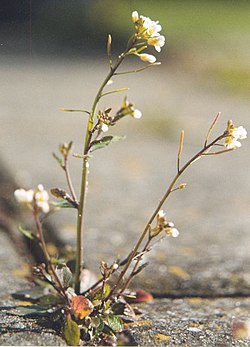Arabidopsis thaliana
species of plant
(Redirected from Arabidopsis)
Arabidopsis thaliana is a small flowering plant native to Europe, Asia, and northwestern Africa. It is widely used as a model organism in plant genetics. Arabidopsis is a member of the mustard (Brassicaceae) family, which includes cultivated species such as cabbage and radish.
| Arabidopsis thaliana | |
|---|---|

| |
| Scientific classification | |
| Kingdom: | |
| (unranked): | |
| (unranked): | |
| (unranked): | |
| Order: | |
| Family: | |
| Genus: | Arabidopsis
|
| Binomial name | |
| Arabidopsis thaliana (L.) Heynh
| |

| |
It was the first plant genome to be sequenced, completed in 2000 by the Arabidopsis Genome Initiative.[1] The most up-to-date version of the Arabidopsis thaliana genome is maintained by The Arabidopsis Information Resource (TAIR).[2]
Much work has been done to find out what its 27,000 genes and 35,000 proteins do.[3] Arabidopsis is a popular tool for understanding the molecular biology of many plant traits, including flower development and light sensing.
References
change- ↑ The Arabidopsis Genome Initiative (2000). "Analysis of the genome sequence of the flowering plant Arabidopsis thaliana". Nature. 408 (6814): 796–815. doi:10.1038/35048692. PMID 11130711. S2CID 205012145.
- ↑ "TAIR - genome annotation".
- ↑ "Integr8 - A. thaliana genome statistics".